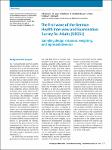The first wave of the German Health Interview and Examination Survey for Adults (DEGS1)
Sampling design, response, weighting, and representativeness
Kamtsiuris, Panagiotis
Lange, Michael
Hoffmann, Robert
Rosario, Angelika Schaffrath
Dahm, Stefan
Kuhnert, Ronny
Kurth, Bärbel-Maria
The “German Health Interview and Examination Survey for Adults” (DEGS) is part of the health monitoring system of the Robert Koch Institute (RKI) and is designed as a combined cross-sectional and longitudinal survey. The first wave (DEGS1; 2008–2011) comprised interviews and physical examinations. The target population comprised 18- to 79-year-olds living in Germany. The mixed design consisted of a new sample randomly chosen from local population registries that was supplemented by participants from the “German National Health Interview and Examination Survey 1998” (GNHIES98). In total, 8,152 persons took part, among them 4,193 newly invited participants (response 42%) and 3,959 who had previously taken part in GNHIES98 (response 62%). In all, 7,238 participants visited one of the 180 local study centres, and 914 took part in the interview-only programme. A comparison of the net sample with the group of non-participants and with the resident population of Germany suggests a high representativeness regarding various attributes. To account for certain aspects of the population structure, cross-sectional, trend and longitudinal analyses were corrected by weighting factors. Furthermore, different participation probabilities of the former participants of GNHIES98 were compensated for.
No license information

